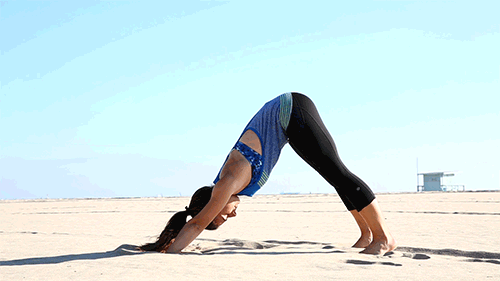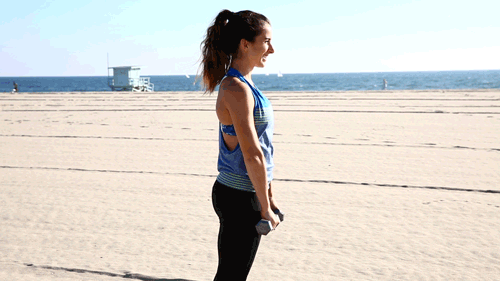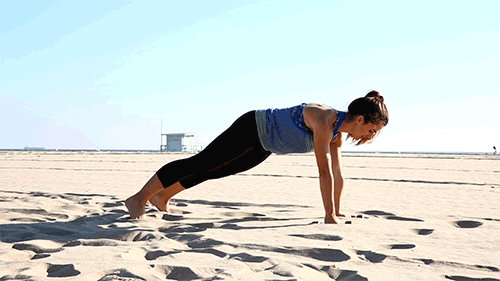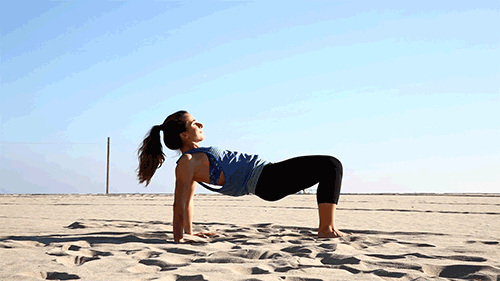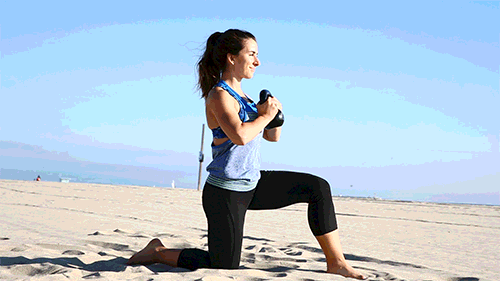Gold Medal Workout: Get a Swimmer’s Body (Without Stepping Foot In The Pool)
Publish Date: August 19, 2016
Last Update: January 23, 2026
From the stiff competition between Michael Phelps and his South African rival to the record-shattering athleticism of the U.S. women’s team (we see you, Katie Ledecky and Simone Manuel), the U.S. swim team gave us lots of reason to spend hours in front of the TV this summer.
They’re beyond impressive, shattering records left and right as they totally dominate the sport. And of course, they’re easy on the eyes. Those broad shoulders and defined arm muscles certainly come from hours of hard work in the pool, but it takes more than swimming endless laps to increase muscle mass.
Swimmers have uniquely fit bodies (so different from gymnasts or track athletes, right?) because they need to be really powerful, yet enough light enough to move quickly through the water. Instead of focusing on hypertrophy, or building bigger muscles, swimmers focus on improving muscular endurance—with the goal of being able to swim longer without getting tired. This type of training also helps builds longer, leaner muscles, and with that comes a lighter bodyweight and more aerodynamic profile.
The pros make it look easy—but cutting through the pool at record-breaking speeds is so much harder than it looks. If it’s been awhile since you’ve strapped on your goggles, try giving this workout a go to work on flexibility, power, and muscular endurance.
Dolphin pose
You know that flapping thing that Phelps does with his arms when he’s up on the blocks right before his race? It’s a shoulder stretch and chest-opening move that improves his range of motion. Swimmers need flexibility and strength—every inch they can gain in the pool by extending their limbs helps their finishing time.
This move is from yoga—it’s a killer shoulder opener and a more advanced version of basic downward-facing dog. Because you bend at a more extreme angle at the hips, you’ll feel this stretch out your hamstrings, too! Start in downward-facing dog, actively pressing your sternum through your shoulders to keep your upper back flat (not hunched or curved). Gently lower down to your forearms. Press down through your hands and your lower arms to create a solid base. Pull the shoulder blades down the spine as you hold this pose for five deep breaths, then slowly lower down to your knees. Do one dolphin now, and one at the end of this workout.
Dumbbell shoulder raise
Shoulder flexibility—check. Now it’s all about that strength. The next three exercises will condition the muscles of the shoulder girdle and the supporting abdominal and back muscles. The dumbbell shoulder raise is a basic but targeted move, so it’s definitely not easy. It’ll help define the deltoids, the upper arm muscles closest to your shoulders, and activate all the muscles you’ll use in the next two exercises.
Stand with feet directly under your shoulders and a dumbbell in either hand—start with a 5- to 10-pound weight. With palms facing down, raise one arm up in front of you so it’s parallel to the ground. Stop your arm as soon as it’s in line with your shoulder. Slowly lower your arm down, and repeat on the other arm. That’s one rep. To improve muscular endurance, use a lighter weight and do 16 to 24 reps. To build bigger muscles, choose a heavier weight and do 8 to 12 reps.
Plank row
This movement tests your core and arm strength—and seriously challenges your balance! Start in a plank position holding a 5- to 10-pound dumbbell in each hand. Row with your right arm, pulling your elbow back directly behind you (so the tip of your elbow is pointing toward the sky); your arm should graze your ribcage as you pull up. Bring your arm down and return to plank. Repeat with the left arm. Do 30 complete reps, or 15 on each arm.
Tricep dips
We often equate huge, strong arms with bulging biceps, when in reality it’s actually the triceps muscles that make up more than 60 percent of arm mass. They’re hard to activate, but it’s worth the trouble, particularly for swimmers—the kick and pull-through arm motion on most strokes wouldn’t be possible without tricep strength.
Enter the tricep dip. The great thing about this exercise is that you can knock it out pretty much anywhere, without a single piece of equipment. We like to use a bench or stair as our base, with legs extended straight out to make this a little more challenging. Make sure your fingers face toward your butt and your inner elbows press toward each other as you as you slowly bend at the elbows to a 90 degree angle, and then extend the arms straight. Do 30 reps.
Half kneeling kettlebell halo
This one is tricky, but we’re pretty sure you’re gonna love it because it works the arms, shoulders, and core. Hello, swimmer’s body! Start with a kettlebell or dumbbell that’s heavy enough to have a bit of resistance (start at around 10 pounds and work your way up or down depending on how it feels).
Kneeling on your left knee with your right foot in front of you, hold the weight in front of your chest with both hands. Engage your core and circle the weight around your head, going over your left shoulder, around the back of your head, and over the right shoulder to return back to the starting position. Do 10 reps, then switch legs and repeat.
Finish with one more dolphin, holding for five breaths.
OK, so if you start this workout today you’ve got a solid four years to train for Tokyo 2020. Go for the gold, people!
Photo credit: Alicia Cho
